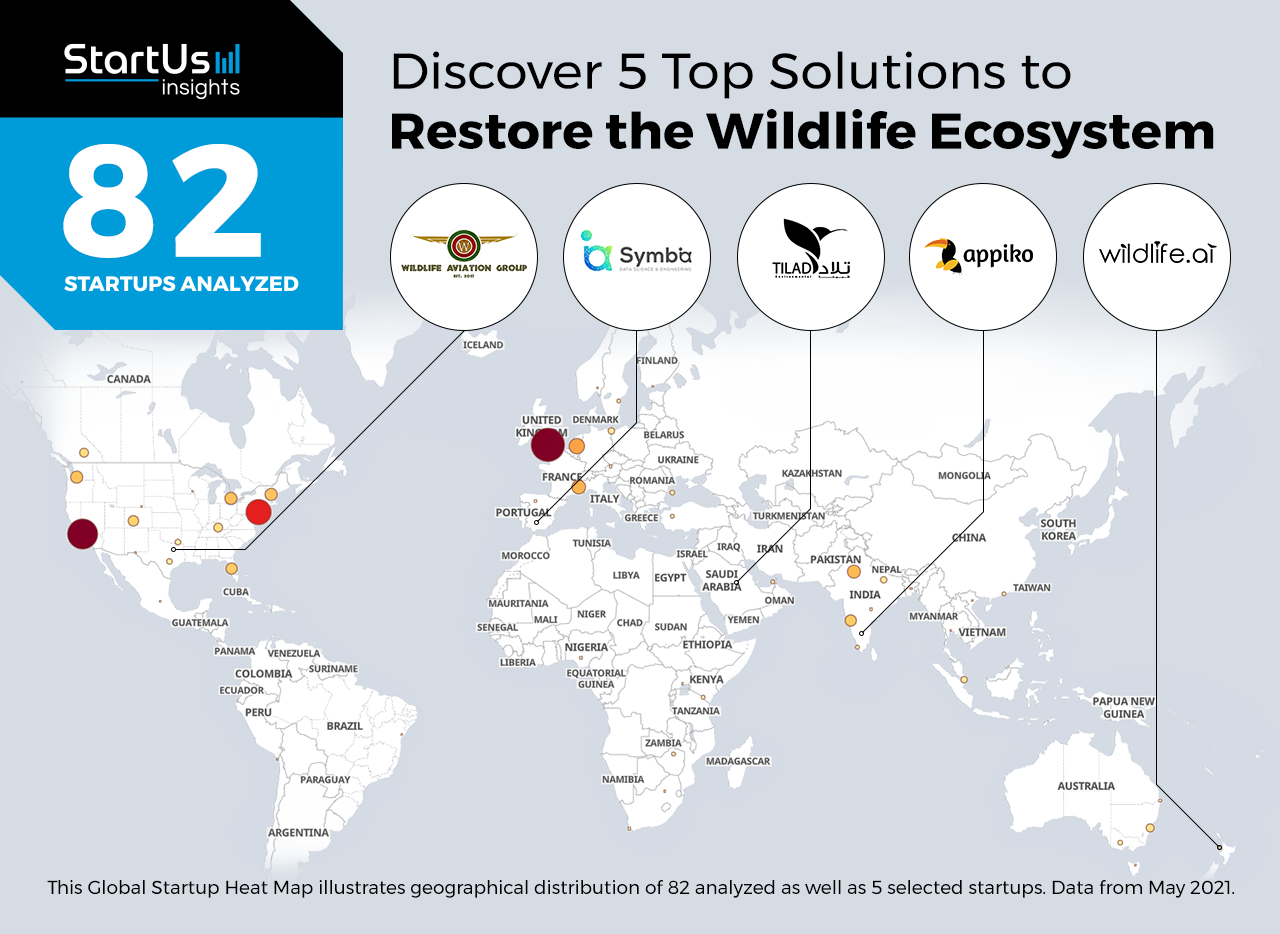Staying ahead of the technology curve means fighting the effects of climate more efficiently. That is why we give you data-driven innovation insights. This time, you get to discover 5 hand-picked startups restoring wildlife ecosystems.
Global Startup Heat Map highlights 5 Top Startups restoring Wildlife Ecosystems out of 82
The insights of this data-driven analysis are derived from the Big Data & Artificial Intelligence-powered StartUs Insights Discovery Platform, covering 2.093.000+ startups & scaleups globally. The platform gives you an exhaustive overview of emerging technologies & relevant startups within a specific field in just a few clicks.
The Global Startup Heat Map below reveals the distribution of the 82 exemplary startups & scaleups we analyzed for this research. Further, it highlights 5 startups restoring wildlife ecosystems that we hand-picked based on criteria such as founding year, location, funding raised, and more. You get to explore the solutions of these 5 startups & scaleups in this report. For insights on the other 77 solutions restoring wildlife ecosystems, get in touch.
Wildlife.ai uses AI to Identify Wild Animals
More than 37.400 assessed species are at the risk of extinction as per International Union for Conservation of Nature (IUCN) reports. Habitat destruction, land overexploitation, poaching, pollution, and climate change deteriorate ecosystem health, furthering extinction risks of wildlife species. NGOs and government bodies strategize various wildlife protection programs to curb the human impact on wildlife species. To this end, startups develop AI-powered solutions to monitor and track animals, ensuring real-time visibility and safety of wild animals.
Wildlife.ai is a New Zealand-based nonprofit organization that develops AI-based species classification solutions for mountain, forest, and sea habitats. The nonprofit applies computer vision to video footage or soundtracks to identify specific wildlife species in protected areas. Further, the nonprofit’s solution notifies conservation managers or community groups when it identifies an animal, allowing them to better preserve native ecosystems.
Wildlife Aviation Group offers Aerial Conservation Services
Many NGOs and wildlife rangers are committed to protecting endangered species and their habitats. However, few wildlife rangers cover vast areas of protected lands as they usually lack personnel or equipment. This affects their efficiency in preventing poaching or illegal logging. To address this challenge, startups help rangers by providing effective drone-based wildlife monitoring solutions. This way, the conservation managers and rangers are able to track animals in real-time and detect illegal human activity.
Wildlife Aviation Group is a US-based nonprofit that offers aerial surveillance systems, as well as aerial conservation training, for effective wildlife conservation. The startup’s Gryphon Aerial Surveillance and Training (GAST) system is a cost-effective and flexible surveillance platform for real-time situational awareness and monitoring. Further, GAST improves risk assessment and critical decision-making for preventing illegal activity and improving response time. As a result, the solution helps governments and NGOs better monitor conservation and wildlife habitats.
Symbia Solutions provides Intelligent Natural Resource Management
The drastic increase in global temperatures threatens all animal ecosystems. Protecting an ecosystem is vital to ensure the safety of its animal species. Further, some species only nurture in selective environments, often also contributing to the stability of a habitat. That is why governments and NGOs focus on protecting forest and ocean ecosystems. It is, therefore, pivotal to efficiently manage wildlife ecosystems and identify the threats due to climate change or other human activities. Startups focus on ways to reduce the impact of human activity before they damage the flora and fauna of an ecosystem.
Spanish data science startup Symbia Solutions offers intelligent natural resource management using AI and the Internet of Things (IoT). The startup’s solutions allow conservation managers and government authorities to evaluate forests using LIDAR systems and detect decay. Further, the startup provides computational modeling to identify and mitigate the effects of climate change in forest ecosystems. This way, Symbia Solutions enables stakeholders to identify potential disruptions in wildlife habitats and proactively protect natural ecosystems.
Appiko creates Animal Sensing Solutions for Wildlife Conservation
Surveying endangered species and ecosystem health using conventional ground-based monitoring is resource-intensive and time-consuming. To counter the limits of traditional wildlife monitoring methods, startups develop cost-effective and non-invasive sensing solutions to better understand wildlife ecosystems. For example, tracking animal movement with LIDAR and other IoT sensors offers near real-time geospatial information on animal movement.
Appiko is an Indian startup that develops sensor-based solutions for animal monitoring and tracking. The startup produces Sense, a proprietary series of app-configurable motion sensors. In particular, Appiko’s SensePi is a fully developed passive infrared (PIR)-based sensor. At present, the startup’s active beam sensor, SenseBe, acoustic sensor, SenseAc, and thermal imaging sensor, SenseTi, are in development. Appiko utilizes Bluetooth Low Energy (BLE) chips on these sensors and Snap devices that receive sensor alerts and performs an action. This reliable low-power communication for devices enable the development of their BLE communication protocol, Seek.
Tilad delivers End-to-End Ecosystem Restoration
Ecosystem restoration often requires grassroots planning for successful project completion. Many companies offer their expertise in ecosystem restoration and preservation to help NGOs protect biodiversity hotspots. This allows conservationists to significantly decrease the restoration project period. Startups also actively help NGOs and government bodies restore entire wildlife habitats and improve animal safety.
Tilad is a Saudi Arabian environmental startup that provides end-to-end ecosystem restoration services. The startup provides species status and ecosystem assessments for conservation projects, as well as complete ecosystem restoration services. Tilad assists governments and conservation managers in intermediate stages of the restoration process with services such as environmental planning, surveys, and assessments. Tilad’s environmental services reduce the planning period and improve the overall efficiency of habitat restoration. Further, the startup offers veterinary consultation and clinical testing, surgery, and reproductive research for camels, birds, and other wildlife.
Discover more Natural Ecosystem Restoration Startups
Startups restoring wildlife ecosystems, such as the examples highlighted in this report, focus on technology-driven wildlife identification, surveillance, and restoration. While all of these technologies play a major role in balancing natural ecosystems, they only represent the tip of the iceberg. To explore more nature conservation technologies, simply get in touch to let us look into your areas of interest. For a more general overview, you can download our free Industry Innovation Reports to save your time and improve strategic decision-making.









